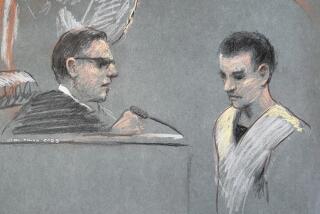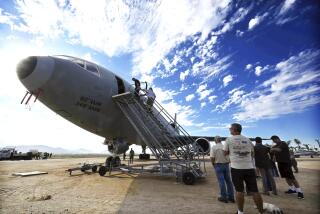Pilot’s Downfall Is a Tale of Sex, Stupidity and Spying
- Share via
BEALE AIR FORCE BASE, Calif. — From the criminal investigators who arrested him to the attorneys who defended him, everyone agreed that what U.S. Air Force Capt. Neil Clark did was not smart.
The Air Force so frowned upon what he did that night in Reno last November that it court-martialed Clark. Major Michael Breslin, Clark’s prosecutor, called it “conduct unbecoming an officer and a gentleman.”
On Wednesday, a jury panel of five superiors found Clark guilty of three charges including a charge of bigamy in what apparently is the first military prosecution of multiple marriage in several years.
During the four-day trial, attention shifted from this sun-baked base’s main mission--maintaining and flying SR-71 and U-2 spy planes--to a strange tale of sex and stupidity, with a hint of espionage.
As Clark’s sexual habits were probed, enlisted men and women filled the small military courtroom at Beale, 40 miles north of Sacramento. While Clark looked on stoically, defense attorney Robert Rivkin called him a “sex addict.”
Like an alcoholic who would do anything for a drink, Clark lost all senses at the promise of a night with a buxom British woman named Margaret Vickerage, Rivkin said. Clark married her at the Heart of Reno Chapel, even though he had been married since 1980 to the mother of his son in Yuba City.
The conviction has serious consequences for Clark. The jury could sentence him today to up to 12 years in prison. Clark, 41, also faces loss of his pension of $1,300 a month, and will have difficulty getting work as a civilian pilot, said Rivkin, who was assisted by Capt. Clayton Moushon, an Air Force defense attorney.
Rivkin argued to Military Judge Kenneth Randall that Clark was singled out for prosecution for his unpopularity at Beale, and his reputation for being openly promiscuous. The lawyer maintained that other officers found to be in potentially compromising affairs have been treated far less harshly.
On March 16, for example, the Air Force Court of Military Review overturned the convictions of six Air Force enlisted men at Nellis Air Force Base near Las Vegas, finding that Joseph E. Miniclier, the military judge who presided over their cases in 1987 and 1988, had an affair with the woman prosecutor.
Although Air Force spokesmen could not confirm the fate of the judge and captain on Wednesday, Rivkin said both were allowed to resign rather than face a court-martial. Clark was given no such option.
As presented by prosecutor Breslin, the case against the pilot was straightforward:
Clark, a flier with 19 years in the Air Force, and Vickerage met in January, 1988, while Clark was on a temporary duty assignment in Okinawa.
Vickerage, 45, lived in the Omaha suburb of Bellevue, but traveled to Okinawa to be with another Air Force pilot, a major who also was detailed there for temporary duty from the Strategic Air Command headquarters at Offutt Air Force Base outside Omaha.
The major, who also was married, was breaking off the relationship. Clark stepped in and began an affair with Vickerage on the night they met.
Vickerage, meanwhile, was beginning to worry about her expiring visa. Not wanting to return to Britain, she hoped to find a man who would marry her, thereby allowing her to become a permanent resident.
As her affair with Clark continued back in the United States, Vickerage hit upon a plan, though as it soon became evident the plan had its flaws.
The couple agreed to rendezvous at a motel near the Reno airport on Nov. 25, 1988. He wanted sex as soon as they arrived. But she wanted a marriage license first, according to the testimony, and they went to the county courthouse where they obtained a marriage license. Then they walked a few steps to the Heart of Reno Chapel, said their vows and returned to the motel.
There, Clark glanced at the immigration forms that Vickerage brought, and signed them, vouching that they were husband and wife. The next morning, realizing what he done, Clark gathered up the papers, scribbled out a note saying he could not go through with it and left, while his “wife” slept.
Back in Nebraska, Vickerage hired a lawyer who asked that Clark sign new immigration forms. When Clark refused, Vickerage let his commander know about the unkept promises. The commander, aware that Clark was married, turned the letter over to the Air Force Office of Special Investigations.
Background Information
OSI agents Thomas W. Flick and David L. Scroggins already knew something about Vickerage and Clark.
In Nebraska, Vickerage hung out with men stationed at the Offutt Air Force Base. Some were married; most had top-secret clearances.
According to an Air Force report dated last December, she made a practice of asking a lot of questions about the Air Force, had a detailed understanding of military aircraft and claimed to have a security clearance. Clark’s name was among the list of 10 military officers and enlisted men and women named in the report who were friendly with Vickerage.
Rivkin alleged in court that Vickerage was practiced at luring men into uncomfortable situations, and charged that she may have been blackmailing two other Air Force officers whom she met in England.
Vickerage could not be reached. She faces no charges in connection with any security breach, and an investigation of her has been closed.
Still, the case raised questions of potential security leaks. At the time of his affair, Clark had a security clearance rated secret. At other times in his career, he had top-secret clearances. He flew KC-135Q jets, which are used in midair refueling of SR-71 Blackbirds. Clark was grounded pending the outcome of his trial.
Spy Planes
Beale, the Air Force’s main reconnaissance base, is the home to the SR-71s, which fly intelligence-gathering missions around the world. They are designed to travel at several times the speed of sound and at altitudes upward of 80,000 feet.
When the agents asked Clark to explain himself, he told them everything, going so far as to give them photos of the woman, some of her in various stages of undress. He was so open about the affair that the agents thought he might have been covering up other more serious crimes.
“Capt. Clark was led to believe that Margaret Vickerage was a foreign agent, and they wanted to talk to him about counterintelligence matters,” Rivkin said, maintaining that the prosecution of Clark will chill others who might be asked to cooperate with espionage investigations. “He wanted to help his country.”
In telling the story, Clark confessed to what became the three charges against him: bigamy, helping in a sham marriage, and conduct unbecoming an officer and gentleman by stating falsely on the Nevada marriage license application that he was not married already.
“It seemed very illogical,” Scroggins said of Clark’s story. But after listening to it all, the agent testified that the motive was not espionage, or anything other than what Clark claimed: The captain was willing to go to great lengths to spend a night with Margaret Vickerage.
More to Read
Sign up for Essential California
The most important California stories and recommendations in your inbox every morning.
You may occasionally receive promotional content from the Los Angeles Times.













